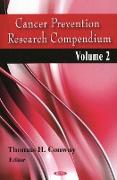Cancer Prevention Research Compendium
BücherAngebote / Angebote:
This book brings together new and important research on cancer prevention. Much of the promise for cancer prevention comes from observational epidemiologic studies that show associations between modifiable lifestyle factors or environmental exposures and specific cancers. Evidence is now emerging from randomised controlled trials designed to test whether interventions suggested by the epidemiologic studies, as well as leads based on laboratory research, result in reduced cancer incidence and mortality. The most consistent finding, over decades of research is the strong association between tobacco use and cancers of many sites. Hundreds of epidemiologic studies have confirmed this association. Further support comes from the fact that lung cancer death rates in the United States have mirrored smoking patterns with increases in smoking followed by dramatic increases in lung cancer death rates, and more recently decreases in smoking followed by decreases in lung cancer death rates in men. Infections may also be associated with cancer development. Human papillomavirus (HPV) infection is a necessary event for subsequent cervix cancer, and vaccine-conferred immunity results in a marked decrease in precancerous lesions. Likewise, Epstein-Barr virus has been associated with Burkitt lymphoma and Helicobacter pylori with gastric cancer, although specific anti-infective interventions have not yet proven effective in preventing these cancers. Additional examples of modifiable cancer risk factors include alcohol consumption (associated with increased risk of oral, oesophageal, breast, and other cancers), physical inactivity (associated with increased risk of colon, breast, and possibly other cancers), and obesity (associated with colon, breast, endometrial, and possibly other cancers). Observational evidence shows associations between alcohol consumption, physical inactivity, and obesity and increased incidence of certain cancers. More research is needed to determine whether these associations are causal and whether avoiding these behaviours would actually reduce cancer incidence. Other lifestyle and environmental factors known to affect cancer risk (either beneficially or detrimentally) include certain sexual and reproductive practices, the use of exogenous estrogens, exposure to ionising radiation and ultraviolet radiation, certain occupational and chemical exposures, and infectious agents. Food and nutrient intake have been and are being examined in relation to many types of cancer.
Folgt in ca. 10 Arbeitstagen
